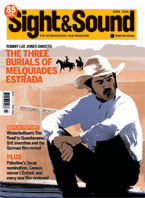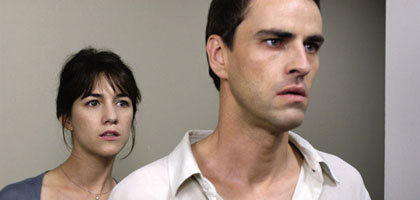
Lemming
France 2005

Reviewed by Kevin Jackson
Synopsis
Our synopses give away the plot in full, including surprise twists.
The south of France, the present. Alain and Bénédicte Getty are a model young couple: he a handsome, gifted young inventor, she a loving wife and conscientious tender of their new house. Alain discovers a lemming in their kitchen S-bend. Alain's much older boss Richard Pollock and his angry, frightening wife Alice come to dinner, and the latter behaves atrociously. A few days later, she tries to seduce Alain at his workplace. She then visits Bénédicte, locks herself in a spare bedroom, and blows her brains out.
Bénédicte starts to behave more strangely, and in a manner eerily reminiscent of Alice. Concerned by her hostile response to a phone call he makes while on a business trip with Richard (whom we glimpse entertaining prostitutes), Alain makes an emergency return, and suddenly enters a nightmare: Bénédicte has gone, and the Gettys' kitchen is swarming with lemmings, who mob and overpower him. He wakes, severely injured, in a hospital bed, and is told that he had actually fallen asleep at the wheel of his car and crashed some time before reaching home. During his convalescence, at Richard's lakeside retreat, a newly affectionate Bénédicte begins to seduce Alain with the same words and gestures Alice had used. She then flees, leaving Alain to hitch his way home, where he discovers that his wife is having an affair with Richard. Alain spies on the new couple, and then, egged on by what he believes to be the ghost of Alice, contrives to kill Richard in a gas explosion made to look like suicide. Alain and Bénédicte are reconciled.
Review
It comes as little surprise to learn that two of Dominik Moll's key points of reference for Lemming were Giorgio de Chirico and Stanley Kubrick. A good part of the film alternates between sun-drenched views of gleaming white modern housing - the south of France at its most Californian-suburban - and murky nocturnal domestic or industrial interiors. Each can be quite as unnerving as the other, since Moll eschews the straightforward Gothic tradition of staging terror only by night, and opts instead for the 'metaphysical' uneasiness of a de Chirico noontime street scene, or the dazzling, disconcerting artificial light of, say, The Shining. His images are often static, sparsely peopled and so quiet that you can hear coffee percolate in the next room: they are pregnant with threat. This is conspicuously self-conscious film-making: Lemming is the kind of drama in which the characters openly and intelligently discuss the possible symbolic value of the titular small mammal in their midst (the lemming is discovered in the S-bend of the kitchen sink of seemingly perfect middle-class couple Alain and Bénédicte Getty). For those seduced by its gradual descent into menace, Moll's most telling achievement will be his creation of a dramatic world that is so flagrantly a piece of high artifice but which can still be enjoyably gripping, even chilling.
Early on, the emphasis is on farce: the Gettys host a dinner party for Alain's boss Richard (André Dussolier) and his wife Alice (Charlotte Rampling). The embarrassment is exquisite: magnificently uncompromising, Alice exposes her husband's promiscuity from behind her incongruous dark glasses. But things modulate at a deliberate pace and with considerable skill, and the focus switches to more fundamental anxieties about how far friends and loved ones can be trusted,
or known at all. Partly by keeping his dialogue mainly brief or mundane, Moll wilfully pares the characters' backstories to a skeletal minimum, or renders them wholly ambiguous (did Richard really try to murder Alice 20 years previously?).
Alice tries to seduce Alain (Laurent Lucas), then commits suicide in the Gettys' home, and Bénédicte (Charlotte Gainsbourg) behaves in an increasingly erratic and Alice-like manner. Much of the film is based on the anguished Alain's perspective, so that the viewer fully shares his bafflement as to whether his vision of a horde of lemmings over-running his kitchen is real or fantastical, or whether Bénédicte's aggressive conduct is a symptom of marital dissatisfaction or possession by the dead Alice (the two Charlottes have such similar looks and gestures they're like sisters). The film flirts with the occult, and though the pay-off scene appears to tidy all the loose spectral ends away in a debunking comic gesture, the impression of daylit spookiness remains undiminished.
For some viewers, it's precisely that anticlimactic conclusion that will be the most unsatisfying note: so much tension, so much emotional violence, all seemingly shrugged off in a return to a domestic bliss as complacent as if the young couple's fall from grace had never happened. Others may find themselves so absorbed by the precision clockwork of the film's structure that they fail to be engaged by the narrative. Obedient to the Chekhovian maxim that a gun shown in act one must be fired by the time the curtain falls, Moll and co-screenwriter Gilles Marchand cram their tale with fearful symmetries: a cute little flying-camcorder gadget humorously demonstrated by Alain in the very first scene becomes a tool of pained voyeurism for him at the height of the drama; Richard offhandedly lauds the virtues of gas cooking at the awkward dinner party and is ultimately cooked by gas himself. But to carp at Moll's excessive craftsmanship would be as churlish as to complain that his mysteries are never adequately resolved. Is the film a bitter domestic comedy with a brutal edge, a fable about complacency (like Hitchcock's The Birds), a drama of unconscious anxieties breaking through flimsy psychic barriers, a yarn of ghosts and possession and sinister synchronicities? All of these, and no doubt more besides.
Credits
- Directed by
- Dominik Moll
- Produced by
- Michel Saint-Jean
- Screenplay
- Dominik Moll
- Gilles Marchand
- Director of Photography
- Jean-Marc Fabre
- Editor
- Mike Fromentin
- Art Director
- Michel Barthélémy
- Original Music
- David Sinclair Whitaker
- With
- Laurent Lucas
- Charlotte Gainsbourg
- Charlotte Rampling
- Certificate 15 130m 19s
